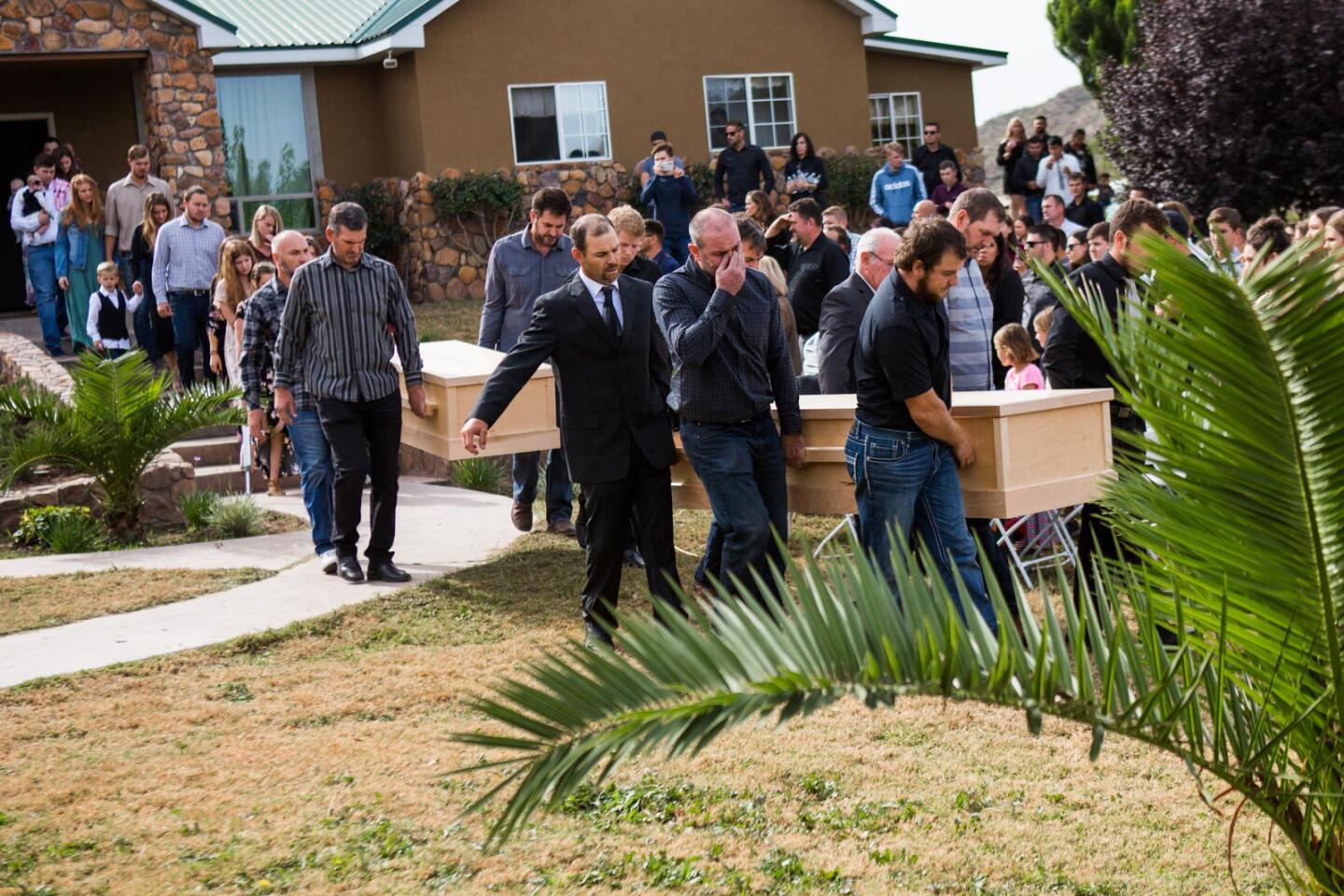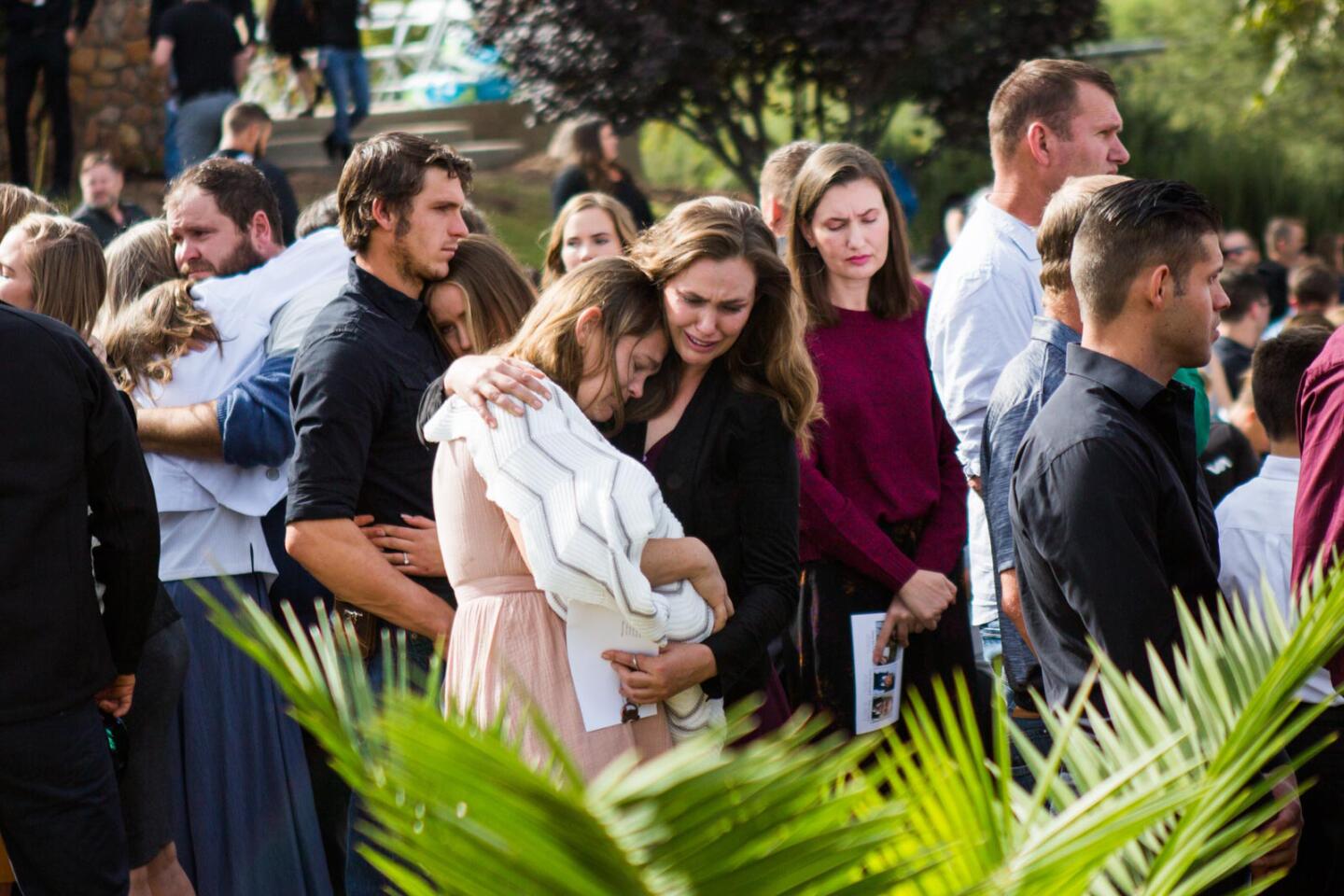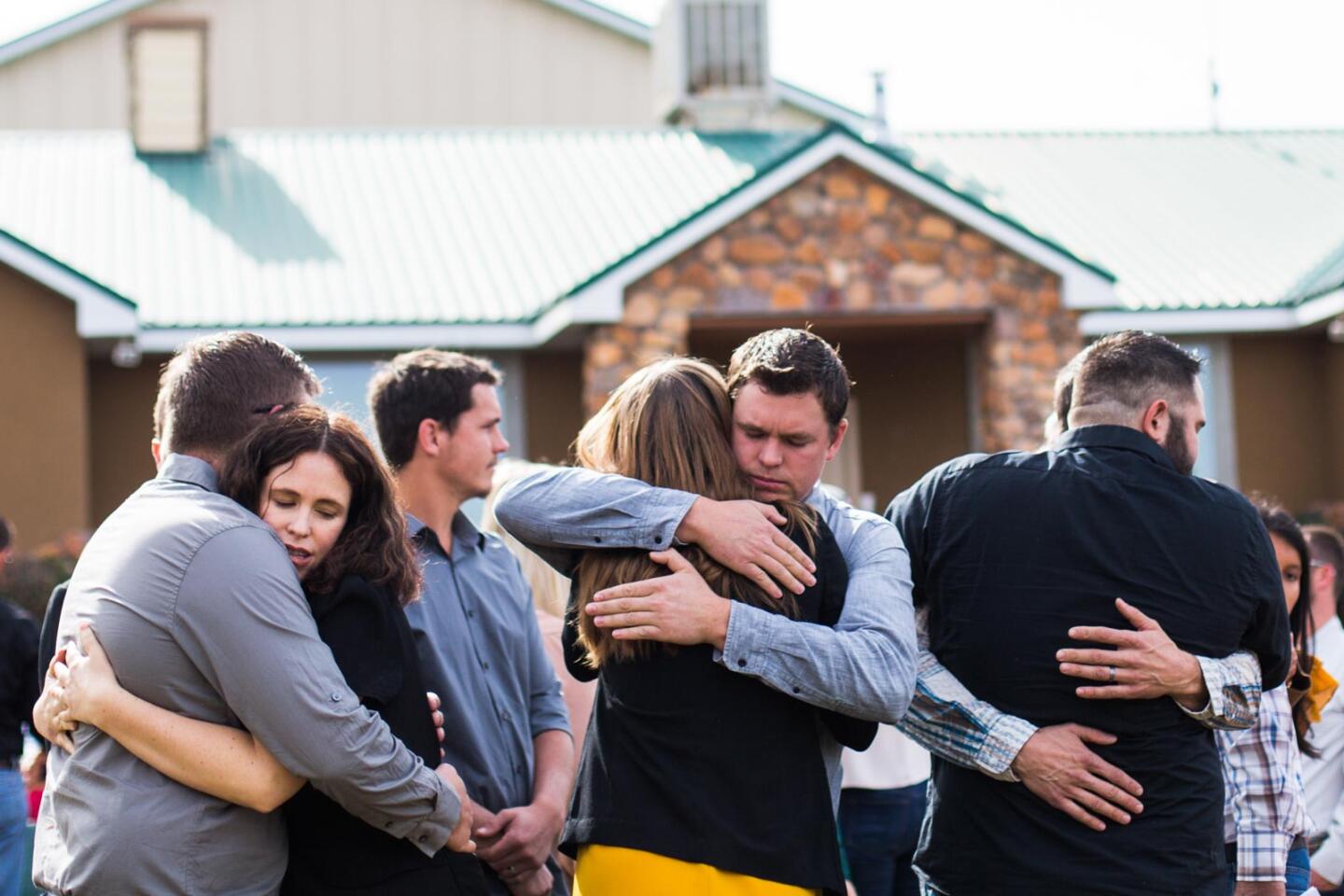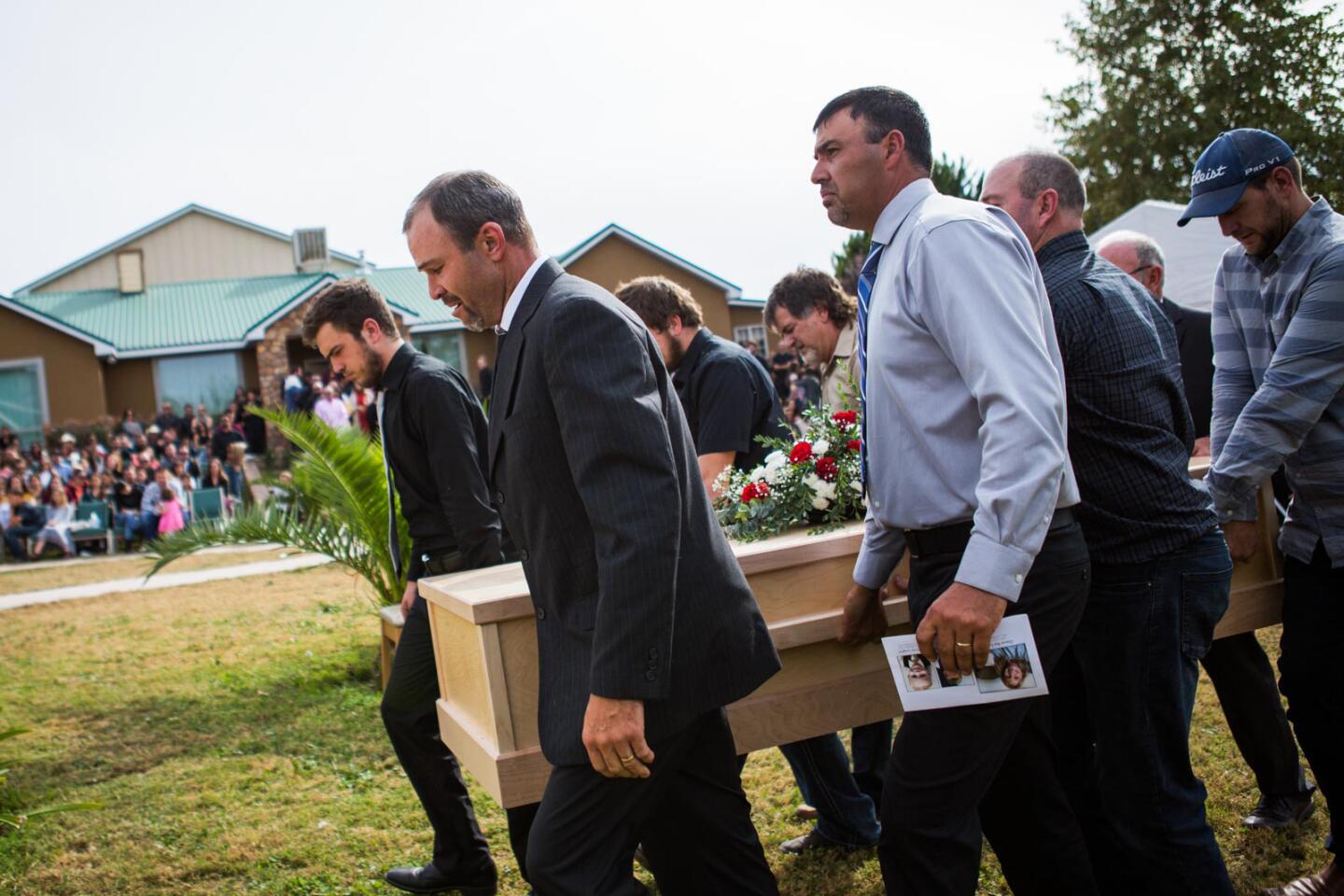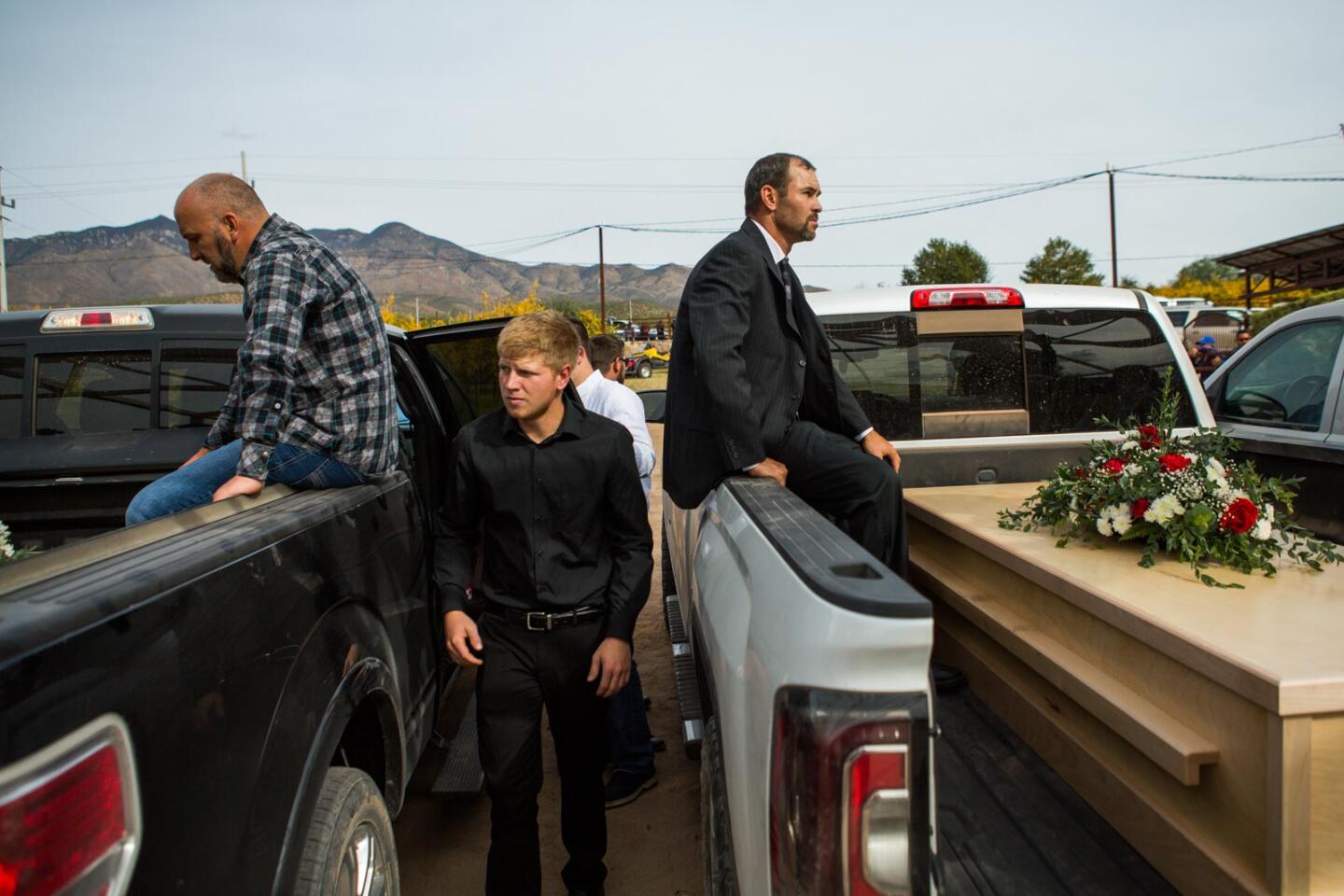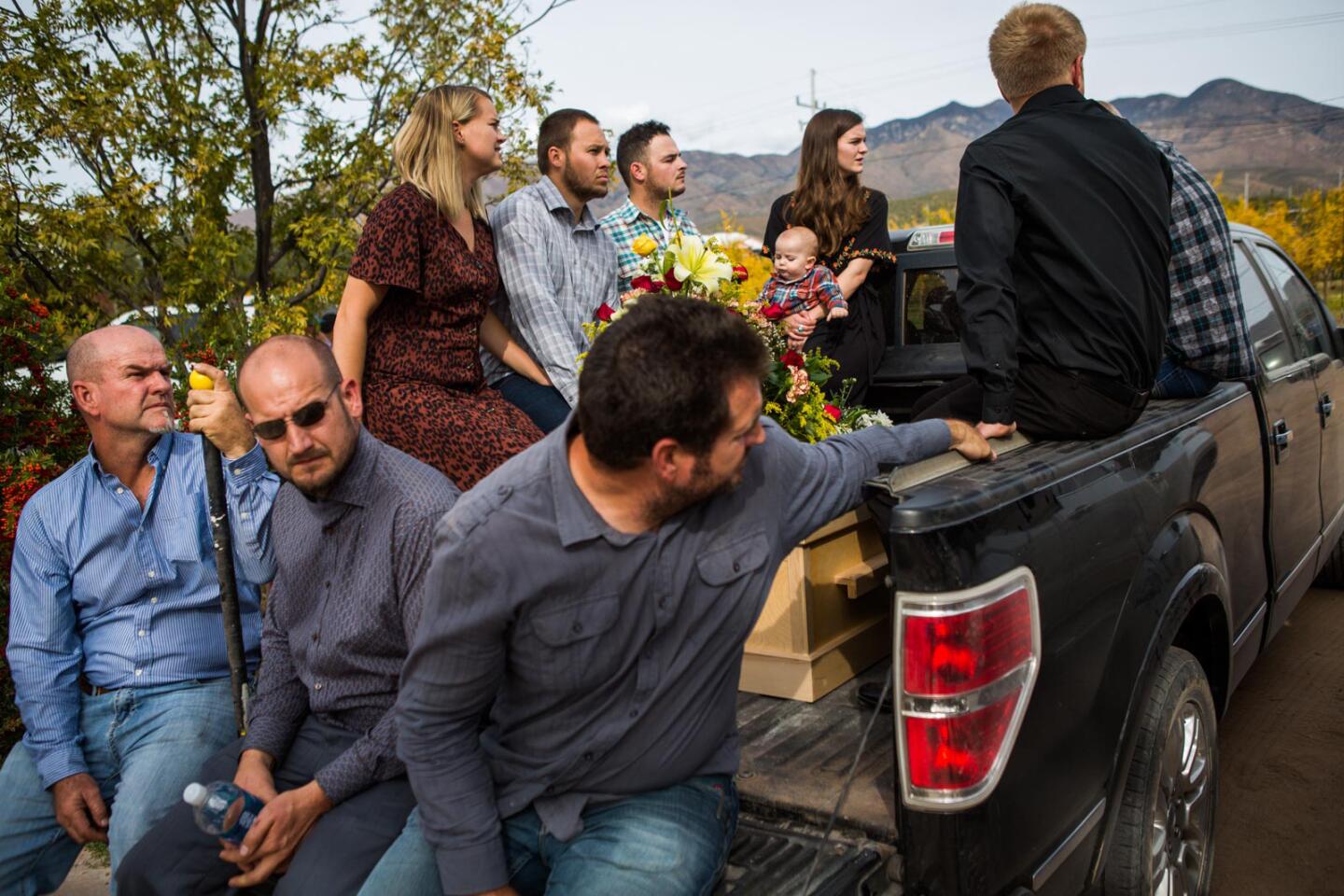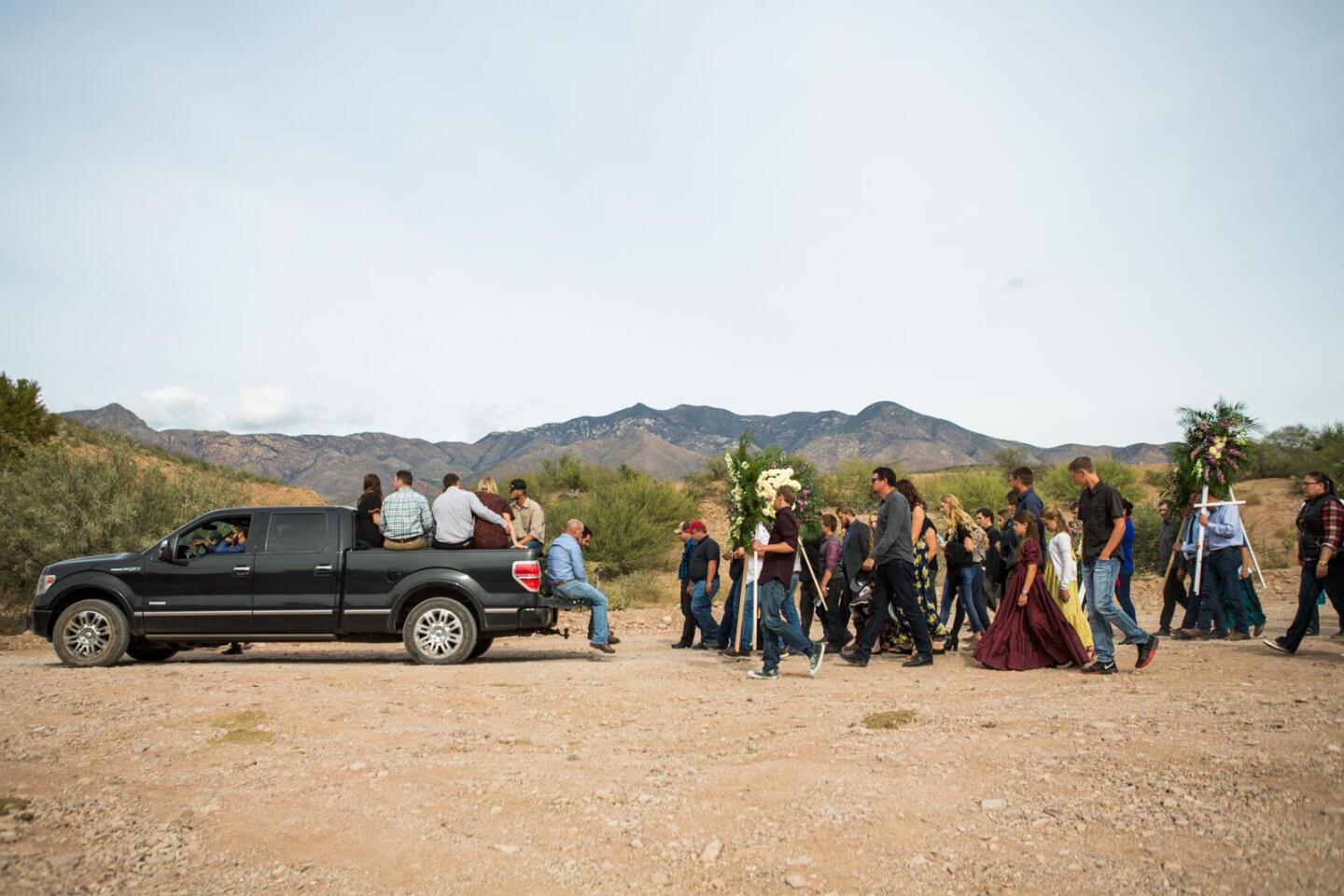Mormons mourn their massacred relatives in Mexico: ‘Our lives will never be the same’
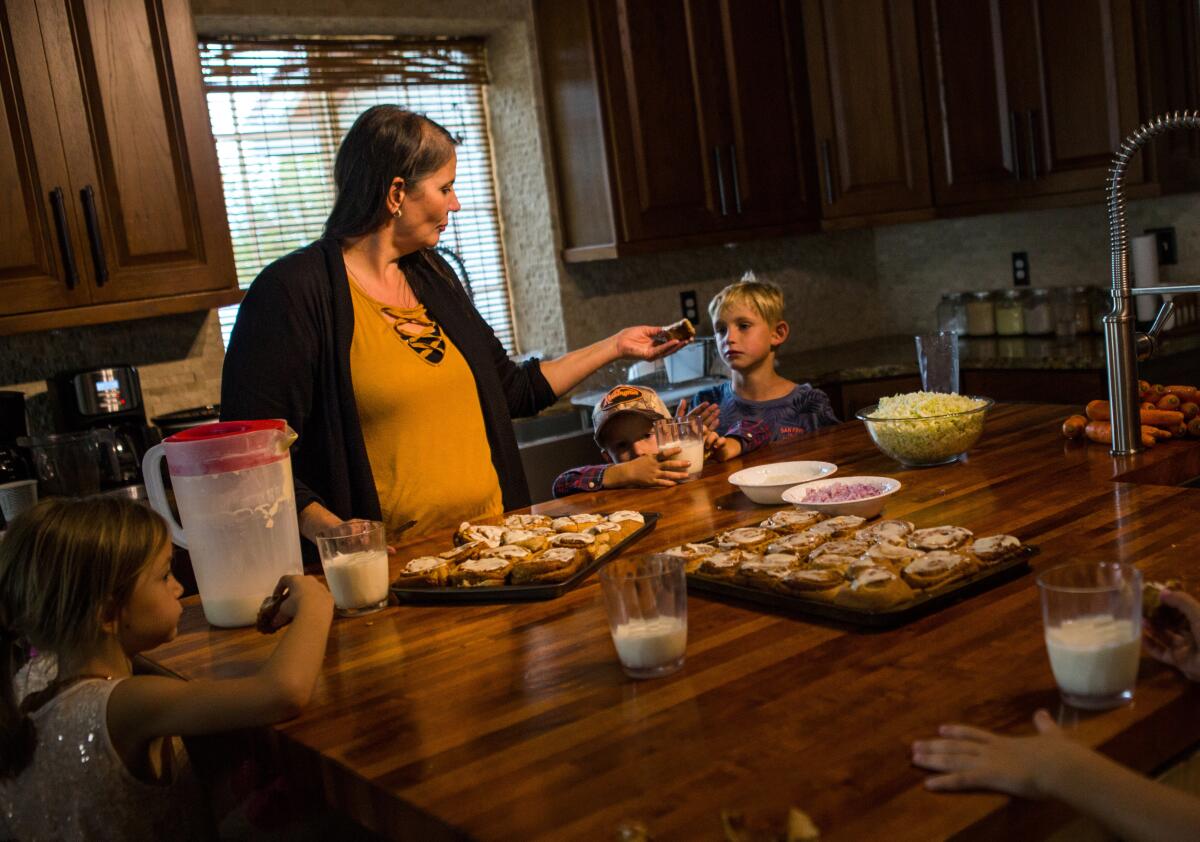
- Share via
LA MORA, Mexico — In the days since her 18-year-old son breathlessly reported that something terrible had happened to her four grandchildren and daughter-in-law, Loretta Miller has cooked nonstop.
Burritos, posole, eggs, potatoes, chicken.
She has cooked to feed the Mexican federal forces sent here to protect her family, the relatives arriving to attend the funerals and the streams of international journalists who have come to this remote corner of northern Mexico to find out why nine American women and children were ambushed and killed while driving through the mountains here Monday.
Raising 14 children and 27 grandchildren prepared Miller for this.
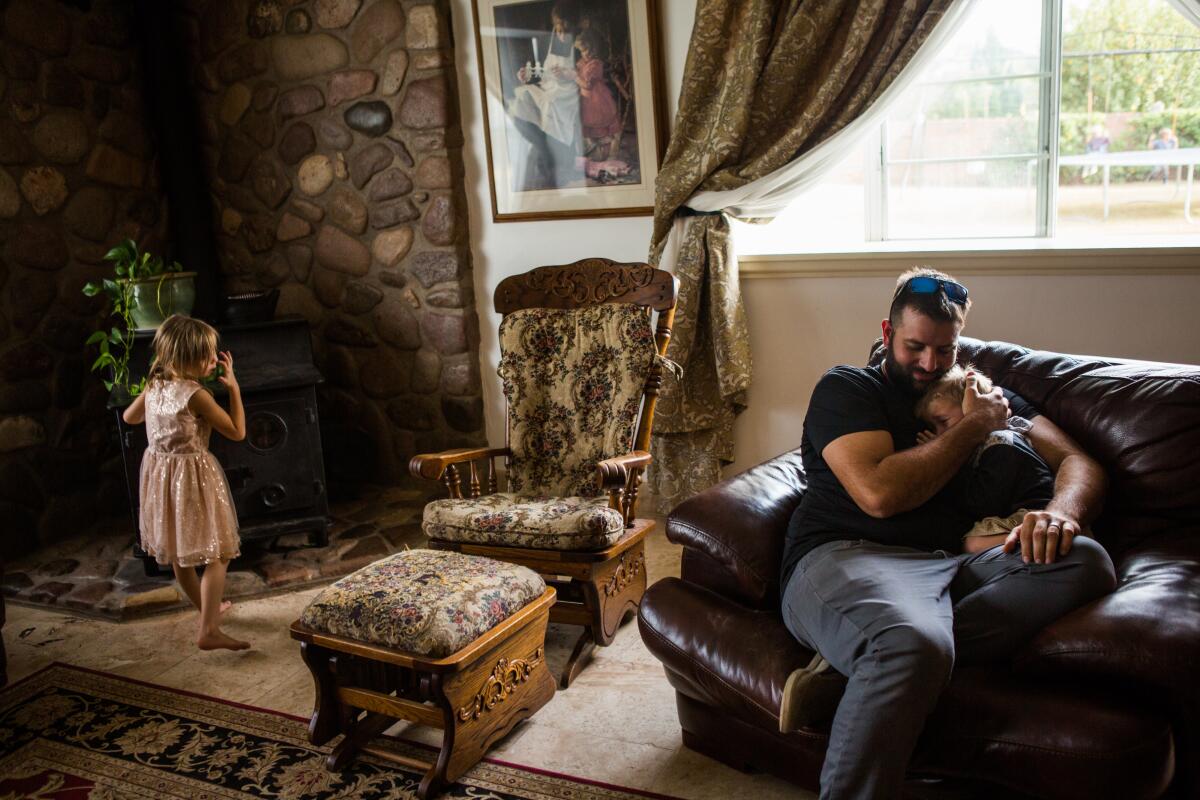
“We’re a big family,” she said as a pot of soup simmered on the stove. “We know how to deal with crowds.”
While most houses in this part of Sonora state are made in the Mexican style of adobe or cinder block, Miller’s would not look out of place on a cul-de-sac in a Southern California subdivision. In this land of soccer, even the basketball hoop in the driveway is a giveaway that the tiny hamlet of La Mora is different.
Amid the landscape of cactus and mesquite, the well-paved blocks of American-style homes and manicured lawns stand out.
So do the town’s residents: a community of largely blond and blue-eyed families from a fundamentalist Mormon sect that hold both American and Mexican citizenship.
Their blue U.S. passports separate them from their neighbors, allowing them to work or own businesses in the United States, while many local Mexicans toil in $8-a-day factory jobs in the low-slung maquilas that hug the border.
Until this week, the Mormons thought they had another kind of American privilege: protection from narco violence. In the 12 years since Mexico declared war on its drug cartels, sparking an era of record-breaking bloodshed, criminal groups have committed horrific acts of violence against Mexicans but have rarely targeted Americans like Miller and her family, aware of the bad publicity and unwanted law enforcement attention it would bring.
That unspoken rule was broken this week when the nine American citizens from the Mormon community were ambushed and killed. So too was another drug war maxim: that women and children are not to be touched.
“Until now, I loved living here,” said Miller, who grew up in a similar Mormon community just over the mountains in Chihuahua state.
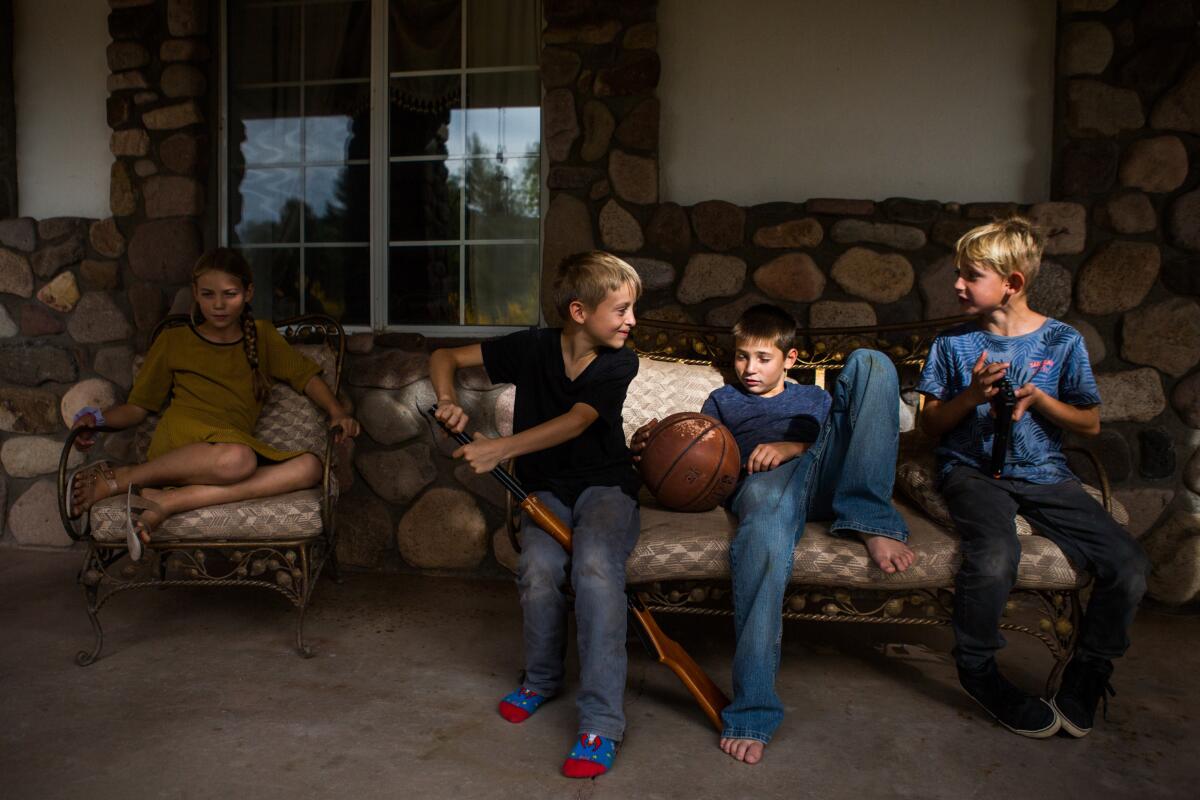
She said her family has long had close relationships with the locals, who work in Mormon homes and on their pecan and pomegranate farms. When Miller’s son died last year in a small-plane crash, more than 1,000 people showed up to the funeral, and his Mexican friends hired mariachis to play.
Losing her son had prepped her and the rest of the family to deal with Monday’s loss, she said. “If that hadn’t happened to us, we never could have survived this.”
Her son Howard moved down from the U.S. with his wife, Rhonita LeBaron, and their children this year, in part to help out after his brother’s death.
LeBaron, who grew up in the Chihuahua Mormon community but had spent years in the United States, was excited about living again in Mexico, where life was more relaxed and where their seven kids could roam.
“She was the perfect mother,” said Miller.
On Monday, LeBaron joined a caravan of women and kids who were leaving town to head to the border to pick up Howard, who was flying back from North Dakota, where he works in the oil business. Traveling together, the women thought, would protect them from the dangers of driving desolate roads through drug cartel country.
Shortly after leaving, LeBaron got a flat tire. The caravan returned home and LeBaron asked Miller: “Do you think that’s a sign that I shouldn’t leave here?” But she left anyway, switching vehicles and heading out again in Miller’s 2011 Chevy Suburban.
When Miller’s son went to check on the broken-down vehicle, he found the Suburban in flames. Up the road, other members of the Mormon community would later discover the two other vehicles that had been part of the caravan riddled with bullets and strewn with bodies.
In total, three mothers and six children were killed by assailants who many here believe were members of a Chihuahua-based drug cartel. The group has been feuding with another cartel that controls La Mora and other parts of Sonora state.
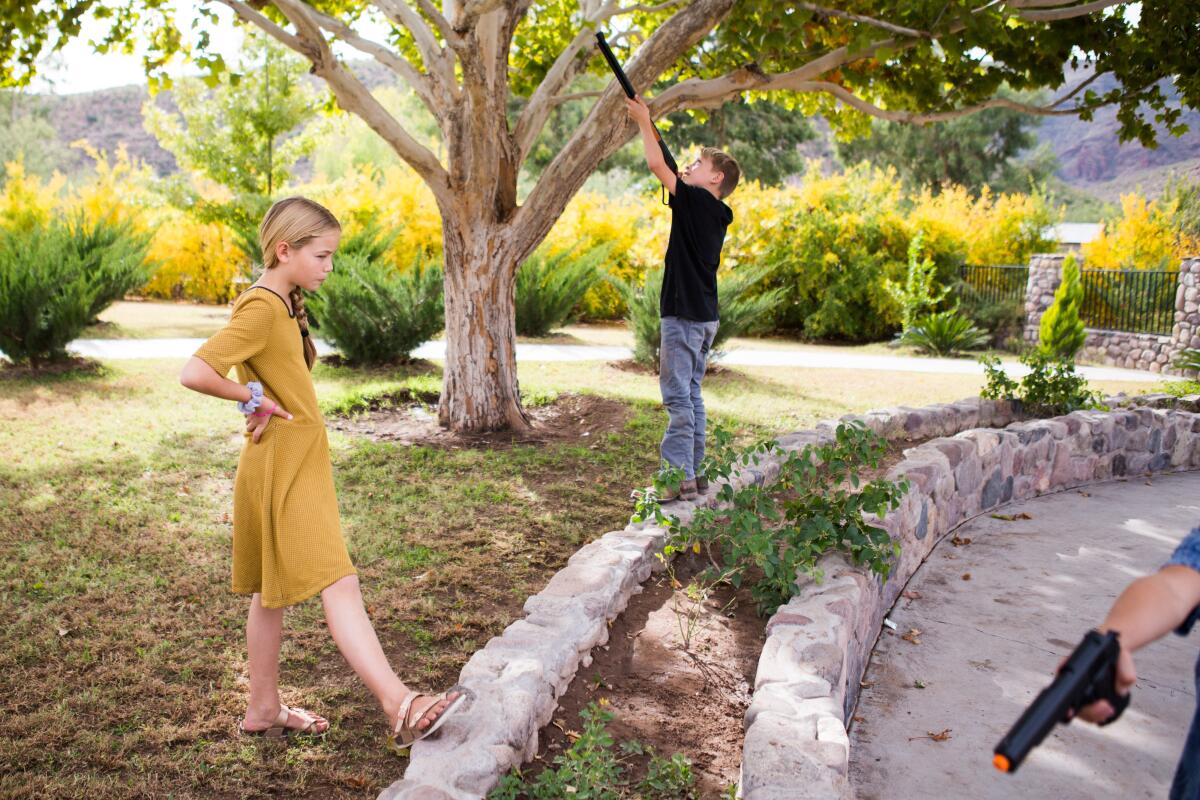
Mexican officials said assailants waged two separate attacks against the three-vehicle caravan.
The first was against 30-year-old LeBaron and her four children, at around 9 a.m. The second occurred about two hours later and about 10 miles up the road and targeted the other two vehicles. It’s not clear why or when the vehicles separated.
Authorities said the gunmen fired .223-caliber ammunition that is manufactured by the American firm Remington and used in M-16 and AR-15 assault rifles.
Eight children survived the second attack. Five were airlifted to Arizona to receive medical treatment, and three were brought to Miller’s house. She stripped them of their bloody clothes, bathed them and massaged them until they finally fell asleep.
“They cried for hours and hours until they couldn’t cry anymore,” she said.
Her son Howard arrived in La Mora on Monday night, bearing gifts for his three surviving children, who were not with their mom in the car that day. The toys helped distract them, but they know what is going on.
Since his life as a family man exploded in a hail of gunfire, Howard Miller hasn’t talked much, except to play with the children. “I love you, baby,” he tells his daughter Amaryllis, 5, cradling her on his lap. “Come here, big boy,” he says to Tristan, 8. In the den where he cuddles them hangs a sign that says, “Families are forever.”
“The cartels had always respected the family,” Miller says. “But they’ve become more ruthless.”
Mexicans have long known that. Homicides have been at record levels for the last several years here, but most killings go unnoticed by the international media.
Police and journalists swarmed this bucolic farming community, but a similar response wasn’t seen when 27 people were burned to death in a strip club in Veracruz in August, or when 14 police officers were ambushed and killed in the span of less than an hour in Michoacan in October.
As families here began burying their dead Thursday, there was an eerie sense that the ground had shifted and life for the Americans had changed. The community did not just grieve for the victims. They mourned a bygone time in which Americans, and especially women and children, were off-limits.
“Our lives will never be the same,” Miller said. “This is the first time I’ve ever thought that I might not spend the rest of my life in Mexico.”
The funerals drew hundreds of friends and relatives from across the United States and Mexico. Those who traveled from the U.S. were met at the border by Mexican soldiers, who escorted them to La Mora.
Willy Jessop, who came from Utah, said some people were afraid to make the trip, fearing they might be targeted.
“Everyone had to balance fear and love,” he said. “But I think love won out.”
Members of the Mormon community in Chihuahua state learned several years ago just how ruthless organized crime had become when a teenager was kidnapped and held for ransom and then the young man’s brother was killed.
In response, members of the community formed their own vigilante police force and spoke openly about smuggling high-powered weapons in from the United States.
“That showed the mafia there that it’s not worth it to mess with us and that it does more harm than good,” Jessop said.
But members of the community in La Mora have not organized in the same way. They have had a kind of truce with the organized crime group that controls their region, which many here describe as a largely benevolent force of order in a remote region rarely visited by authorities. Locals say the cartel keeps thieves out and even makes sure drivers obey the speed limit.
On Thursday, Jessop attended the memorial service for Dawna Ray Langford, 43, and her sons Trevor, 11, and Rogan, 2.
Five of Langford’s other children were wounded in the attack. One of them was shot in the jaw. Another was shot in the stomach.
The memorial service was held on a sloping green lawn behind a handsome stucco home that belonged to relatives of the Langfords. The 400 guests sang together and prayed together, and then listened as Langford’s children told stories about their mom.
Langford’s husband, David, sat in the front row with his second wife, Margaret. Though not all members of the community here practice polygamy, the Langfords did. This breakaway sect of Mormons ended up in Mexico after the Church of Jesus Christ of Latter-day Saints began cracking down on polygamists.
Bryce Langford, Dawna’s eldest son, recalled his mother’s love of coffee and her habit of telling stories that sometimes stretched beyond the truth.
“She was my best friend, the perfect coffee partner and the perfect mother,” he said between tears. He recalled first hearing about the shooting on Monday, and driving frantically from North Dakota.
“Every mile that we drove down got more and more painful because the reality was sinking in,” he said.
Many members of the community were thinking about leaving Mexico, said Joe Darger, a Utah resident whose daughter lives in La Mora. “I didn’t feel safe. No one feels safe,” he said. “And that’s your primary need as a human being.”
As the sun set Thursday, the Miller family was preparing a funeral of their own. They put out hundreds of folding chairs for a memorial service in the backyard and erected wreaths of flowers, including one that spelled out “Angels” in pink roses. The youngest victims in the Miller family were twins Titus and Tiana, who were born March 13.
At a certain point, people got hungry. They looked to Loretta Miller. So she took out cheese and turkey from the refrigerator and began making sandwiches.
More to Read
Sign up for Essential California
The most important California stories and recommendations in your inbox every morning.
You may occasionally receive promotional content from the Los Angeles Times.
